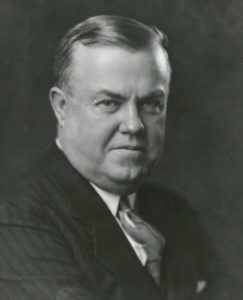
Photo info ...
Credit: Bass Photo Co Collection, Indiana Historical SocietyView Source
(Nov. 17, 1873-Dec. 2, 1939). A native Hoosier, Herschell, for 37 years, was a reporter for the . His poems and verses, which appeared in the paper each Saturday, were reminiscent of the work of his friend . Literary historian Arthur W. Shumaker noted that Herschell “received the mantle of Hoosier folksy poetry from Riley; yet the mantle fitted awkwardly.”
Herschell’s best-known work is the poem “Ain’t God Good to Indiana?,” inscribed on a bronze plaque in the rotunda of the . Born in Spencer, Herschell was the son of Scottish immigrants John and Martha Herschell. His father was a railroad mechanic and machinist and the family lived in several Indiana towns. Herschell attended school in Huntingburg but left in the seventh grade to work in a machine shop.
He began his journalism career with the , moving to the after meeting the paper’s editor, James McCormick, during a visit home. In 1902, he joined the Indianapolis News staff as a feature writer. He married Josephine Pugh, who also worked at the News, in 1908. While at the Indianapolis newspaper, Herschell—along with humorist , creator of cartoon philosopher Abe Martin, and cartoonist Gaar Williams—was a member of what was known as the “idle ward.”
After finishing their morning work for the afternoon paper, the men would congregate in the News building to talk and fill the wall with their drawings and verse. Along with his poems, during World War I Herschell wrote a number of war songs. His popular song “Long Boy” contributed the doughboy refrain, “Goodbye Ma! Goodbye Pa! Goodbye mule with your old heehaw!” to the nation’s vocabulary.
In 1917, Wabash College awarded him an honorary master of arts degree for his war verses. Herschell’s poetry from his days is collected in several books published between 1915 and 1928. A posthumous collection by his widow, , appeared in 1940.

Help improve this entry
Contribute information, offer corrections, suggest images.
You can also recommend new entries related to this topic.